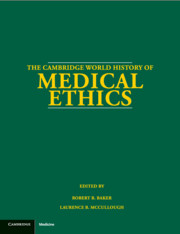Book contents
- Frontmatter
- PART I AN INTRODUCTION TO THE HISTORY OF MEDICAL ETHICS
- PART II A CHRONOLOGY OF MEDICAL ETHICS
- PART III DISCOURSES OF MEDICAL ETHICS THROUGH THE LIFE CYCLE
- PART IV THE DISCOURSES OF RELIGION ON MEDICAL ETHICS
- PART V THE DISCOURSES OF PHILOSOPHY ON MEDICAL ETHICS
- PART VI THE DISCOURSES OF PRACTITIONERS ON MEDICAL ETHICS
- 19 The Discourses of Practitioners in Africa
- 20 The Discourses of Practitioners in India
- 21 The Discourses of Practitioners in China
- 22 The Discourses of Practitioners in Japan
- 23 The Discourses of Practitioners in Ancient Europe
- 24 The Discourses of European Practitioners in the Tradition of the Hippocratic Texts
- 25 The Discourses of Practitioners in the Ninth- to Fourteenth-Century Middle East
- 26 The Discourses of Practitioners in Medieval and Renaissance Europe
- 27 The Discourses of Practitioners in Sixteenth- and Seventeenth-Century Europe
- 28 The Discourses of Practitioners in Eighteenth-Century France and Germany
- 29 The Discourses of Practitioners in Eighteenth-Century Spain
- 30 The Discourses of Practitioners in Eighteenth-Century Britain
- 31 The Discourses of Practitioners in Eighteenth-Century North America
- 32 The Discourses of Practitioners in Nineteenth- and Twentieth-Century France
- 33 The Discourses of Practitioners in Nineteenth- and Twentieth-Century Spain
- 34 The Discourses of Practitioners in Nineteenth- and Twentieth-Century Germany
- 35 The Discourses of Practitioners in Eighteenth- to Twentieth-Century Russia and Soviet Union
- 36 The Discourses of Practitioners in Nineteenth- and Twentieth-Century Britain and the United States
- 37 The Discourses of Practitioners in the Modern and Contemporary Islamic Middle East
- PART VII THE DISCOURSES OF BIOETHICS
- PART VIII DISCOURSES ON MEDICAL ETHICS AND SOCIETY
- Appendix: Biographies: Who Was Who in the History of Medical Ethics
- Bibliography
- Index
24 - The Discourses of European Practitioners in the Tradition of the Hippocratic Texts
from PART VI - THE DISCOURSES OF PRACTITIONERS ON MEDICAL ETHICS
Published online by Cambridge University Press: 28 May 2012
- Frontmatter
- PART I AN INTRODUCTION TO THE HISTORY OF MEDICAL ETHICS
- PART II A CHRONOLOGY OF MEDICAL ETHICS
- PART III DISCOURSES OF MEDICAL ETHICS THROUGH THE LIFE CYCLE
- PART IV THE DISCOURSES OF RELIGION ON MEDICAL ETHICS
- PART V THE DISCOURSES OF PHILOSOPHY ON MEDICAL ETHICS
- PART VI THE DISCOURSES OF PRACTITIONERS ON MEDICAL ETHICS
- 19 The Discourses of Practitioners in Africa
- 20 The Discourses of Practitioners in India
- 21 The Discourses of Practitioners in China
- 22 The Discourses of Practitioners in Japan
- 23 The Discourses of Practitioners in Ancient Europe
- 24 The Discourses of European Practitioners in the Tradition of the Hippocratic Texts
- 25 The Discourses of Practitioners in the Ninth- to Fourteenth-Century Middle East
- 26 The Discourses of Practitioners in Medieval and Renaissance Europe
- 27 The Discourses of Practitioners in Sixteenth- and Seventeenth-Century Europe
- 28 The Discourses of Practitioners in Eighteenth-Century France and Germany
- 29 The Discourses of Practitioners in Eighteenth-Century Spain
- 30 The Discourses of Practitioners in Eighteenth-Century Britain
- 31 The Discourses of Practitioners in Eighteenth-Century North America
- 32 The Discourses of Practitioners in Nineteenth- and Twentieth-Century France
- 33 The Discourses of Practitioners in Nineteenth- and Twentieth-Century Spain
- 34 The Discourses of Practitioners in Nineteenth- and Twentieth-Century Germany
- 35 The Discourses of Practitioners in Eighteenth- to Twentieth-Century Russia and Soviet Union
- 36 The Discourses of Practitioners in Nineteenth- and Twentieth-Century Britain and the United States
- 37 The Discourses of Practitioners in the Modern and Contemporary Islamic Middle East
- PART VII THE DISCOURSES OF BIOETHICS
- PART VIII DISCOURSES ON MEDICAL ETHICS AND SOCIETY
- Appendix: Biographies: Who Was Who in the History of Medical Ethics
- Bibliography
- Index
Summary
INTRODUCTION
To describe the ethical writings within the Hippocratic Corpus is far easier than to evaluate their use and influence over the centuries. There are two main reasons for this. First, our surviving ancient and medieval sources are so scattered that it is difficult to gain a coherent impression of developments over different centuries, cultures, and communities. Second, and far more significant for the historian of ethics, the very notion of Hippocratic morality has changed considerably over the centuries, both in the narrow sense of works written by or associated with Hippocrates, and in the wider sense of a system of medical ethics that appeals, in some way, to the very earliest days of Greek medicine for its values. Indeed, far from determining contemporary medical morality, the Hippocratic Oath, the major ethical text that has been presumed to have normative value, has been regularly adapted and interpreted to fit the concerns of the present (Hippocrates 1923a, 289–301; Nutton 1995, 1996a).
THE HIPPOCRATIC TEXTUAL TRADITION
It is important to realize at the outset that in Antiquity, and arguably until the nineteenth century, what Hippocrates was thought to have believed and written about matters ethical was not confined to the handful of deontological texts within our Hippocratic Corpus. Although it is likely that the Corpus was largely formed in Alexandria by 250 BCE, it was never a fixed body of writings.
- Type
- Chapter
- Information
- The Cambridge World History of Medical Ethics , pp. 359 - 362Publisher: Cambridge University PressPrint publication year: 2008
- 1
- Cited by



